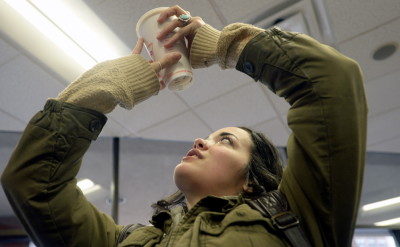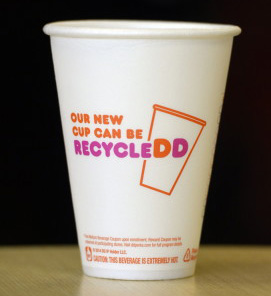Coffee shops and restaurants in Portland are ready for the ban that goes into effect Wednesday on polystyrene cups and takeout containers, but it will likely be consumers who foot the bill in the long run, businesses say.
The city ordinance, passed in June along with a nickel fee for use of disposable plastic or paper bags, was opposed by some business owners in the city who saw the effort as burdensome to businesses.
However, environmentalists looking to reduce the amount of non-biodegradable trash on city streets and in waterways prevailed.
“We realize cost and convenience are important … but today’s convenience can become tomorrow’s pollutant,” said Cathy Ramsdell, executive director of Friends of Casco Bay, a proponent of the new rules.
At Hannaford Supermarket on Forest Avenue, polystyrene products are already off the shelves, and the store has switched to other materials for certain packaging, such as for meat trays, said Eric Blom, Hannaford spokesman. He said the city’s new ordinance is not a major financial burden for Hannaford.
But at smaller stores, the costs will be felt more directly, said one distributor.
“It ends up costing the end user more money; the stores can’t eat that,” said Jim Tarsetti, a salesman at Pine Tree Paper, which stocks thousands of packaging products and serves Greater Portland.
He said the company has been offering environmentally friendly packaging products for 20 years.
Freeport, he noted, has long banned polystyrene, and it was an easy transition for businesses there when it became the first town in the region to take the step.
Now Freeport is one of five towns in southern Maine that are weighing local laws aimed at plastic shopping bags. York, Falmouth, Brunswick and Topsham are considering measures, and Freeport is contemplating an outright ban.
At City Deli in One City Center in Portland, owner Marco DeSalle plans to raise prices in several months to keep up with the increased cost of the alternative packaging material.
“I understand the reason for it,” DeSalle said. “It’s probably time to change some things. We only have one Earth.”
For DeSalle, the new biodegradable products cost about twice as much as their predecessors. For a 6-by-6-inch to-go container, the new recycled cardboard containers cost him 15 cents, up from 7 cents for Styrofoam. The 8-by-8-inch containers cost 24 cents, up from 13 cents.
Although some customers notice the difference, DeSalle doubts that anyone will after a few weeks.
At Dunkin’ Donuts at One City Center, where large and extra-large polystyrene cups were a staple, a more durable, recyclable version is already on the racks.
Some customers have complained that the thinner polypropylene cups don’t keep coffee as hot as the old cups, said franchise owner Danny Bouzianis. Others, meanwhile, say they like the new versions.
One Dunkin’ Donuts customer, 22-year-old Emily Armstrong of Portland, said she believes the city is doing the right thing, and that instituting fees will help focus people on the pressing need for action on environmental issues.
Whether people respond and recycle the new products is not up to the City Council.
“Portland’s done a pretty good job of paying attention to the environment and to local businesses, but at the end of the day it’s about each individual person caring about the future,” Armstrong said.
Copy the Story LinkSend questions/comments to the editors.





Success. Please wait for the page to reload. If the page does not reload within 5 seconds, please refresh the page.
Enter your email and password to access comments.
Hi, to comment on stories you must . This profile is in addition to your subscription and website login.
Already have a commenting profile? .
Invalid username/password.
Please check your email to confirm and complete your registration.
Only subscribers are eligible to post comments. Please subscribe or login first for digital access. Here’s why.
Use the form below to reset your password. When you've submitted your account email, we will send an email with a reset code.